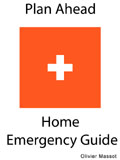- Publications:
- Newsletter:
- How-To Tutorials:
- Consumer Guides:
- Related:

Home Emergency
Preparedness Guide

Shedding Light On A Power Failure
By Al Ubell & Label Shulman
Published October 5, 1982 - Family Circle Magazine
Updated July 19, 2005

There is a “bright” side to every power failure. Remember the 1965 power blackout or the more recent 2003 power outage along the East Coast? Were you prepared?
When we loose electricity in the home, we may loose access to many resources: lighting, television, internet, radio, refrigeration, heat and or hot water. Power failures may even affect telephone lines. Many kinds of disasters can create power outages: ice and snowstorms, hurricanes, tornadoes, floods, earthquakes, human error or even mechanically induced power-grid failures.
In thinking about emergency preparedness for power outages or disasters, it's important to keep in mind that there are two types of emergencies: those for which you have prior warning, such as hurricanes, snowstorms or floods; and those which strike suddenly, such as tornadoes, earthquakes, blizzards and power-grid failures. Below is a checklist to help you plan ahead for home emergencies. Taking extra precautions now may prevent future potential disasters.
Emergency Checklist
- Emergency Telephone Numbers:
- Police: __________________
- Fire Department: _________________
- Ambulance: ___________________
- Doctor: ___________________
- Hospital: ___________________
- Utility Company: __________________
- Water Company: ___________________
- Neighbors: _______________________
- Other: _______________________
- Portable radio with extra batteries. Keep batteries in a plastic bag and store in the refrigerator.
- First-aid Kit. Keep an assortment of bandages, gauze pads, tourniquet, tweezers, scissors, wood splints, antiseptic cream or liquid; a first-aid manual (from the Boy Scouts, Red Cross or your local ambulance corps). For other items, check with your pharmacist. Extra supplies of medications taken by family members. A week's supply is recommended.
- Backup Power Generator. Electrically operated life support equipment (such as suction machines, respirators, kidney dialysis machines, atomizers, etc.) require continuous power. Notify your local electrical utility company and Police Department of such equipment now. Also consider the purchase of a portable generator.
- Food. Keep a supply of canned and powdered goods that can be prepared without stove or oven and that require no refrigeration. Buy foods with high energy content (dried fruit, honey, raisins, even chocolate) to maintain body heat and energy levels. Keep a manual can opener on hand.
- Clothing. Depending upon your region of the country, a supply of warm and/or water-repellent clothing should be kept handy. Wear a hathalf the heat of your body is lost through your head! Keep warm more effectively by wearing several layers of thin clothing rather than one heavy, bulky coat. Extra blankets and sleeping bags are a must.
- Emergency lighting. Have on hand a flashlight for every family member and a supply of extra batteries; kerosene or hurricane lamps with an extra can of kerosene; a box of large candles and a supply of matches, of course.
- Emergency heating, if you have a working fireplace or a wood-burning stove, keep them well maintained and stock a good supply of wood. Kerosene, propane or gasoline space heaters are good suppliers of heat, but make sure your unit is UL (Underwriters Laboratories) listed.
- Fire safely equipment. In case of an emergency or accident, stock several fire extinguishers in your home, buckets of sand, an ax or hatchet and a shovel. Many fire departments have special classes or provide home instruction on the proper use of these items.
- Windows and windstorm precautions. Keep a supply of tape and boards in your home to protect windows and doors.
- Water Pipes. Plastic wrap, newspapers and plenty of tape to wrap around water pipes to prevent freezing should be available. Automobile antifreeze or inexpensive denatured alcohol should be kept to be put into toilets and toilet tanks, dish and clothes washers and drains and traps that are hard to reach. This will prevent freeze-up and rupturing of the pipes.
Evacuation Preparations
If a hurricane or storm watch is announced, there are several ways to prepare yourself and the home to weather the weather:
- Store drinking and toilet-flushing water in as many containers as you can. Also fill up the bathtub and any spare sinks.
- In addition to securing windows and doors, store away lawn furniture, garbage cans, etc. They will become dangerous projectiles if left outdoors.
- Turn refrigerator and freezer to their highest cooling setting to protect your perishables for as long as possible.
- Keep fuel levels as high as possible, especially in cold climates, in case you're snowed in and the power is still working.
- Fill your automobile gas tank in case of need to evacuate.
- Check your emergency provisions.
Recovery
Once a storm or hurricane has hit and an electrical failure has occurred, it's time to put your good sense to work.
- If the lights go out and there is no heat, check fuse or circuit-breaker panel box for short circuit. The outage may be within your home, not area-wide. Check the heating system emergency switch; it may have been inadvertently turned off. Check the pilot light on gas furnaces, and fuel-tank levels for oil furnaces.
- If the power failure is real, pull out plugs on all electrical appliances and turn off the power switch on your furnace. This will help prevent damage to them with a power surge when the electricity comes back on.
- Do not open the freezer or refrigerator doors unless absolutely necessary. When power outage is over, refreeze only those foods that have ice crystals on them. Cook and use other food if possible.
- In cold climates, close off as many rooms as possible and centralize family life in one or two rooms. Hang blankets or sheets over windows to keep out cold air.
- If you must use a candle for lighting, place it in a glass and fill the glass two-thirds with cooking oil. When the candle burns down, it'll turn into an oil lamp, which lasts for hours because the oil burns instead of the wick. If all you have on hand is a birthday candle, place it in a jar of petroleum jelly. It'll burn for a long time, too.
- Don't drink alcoholic beverages or use tranquilizers. They slow down body functions and you'll also become colder. Hypothermia (dangerous loss of body heat) can take place without the person realizing he or she is in trouble. Be particularly careful to avoid prolonged exposure to wet or cold weather. Keep dry and warm.
Copyright © Alvin Ubell, Label Shulman & Family Circle Magazine - 1982
Accurate Building Inspectors ®
www.AccurateBuilding.com





